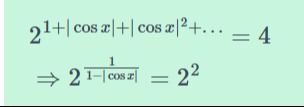Question
Question: Given the equation \[2^{1 + |\cos x| + |\cos x|^2 + \dots} \;=\; 4,\] show that this implies \[2^{...
Given the equation 21+∣cosx∣+∣cosx∣2+…=4, show that this implies 21−∣cosx∣1=22 and hence find all solutions for x.

Answer
∣cosx∣=21⟹cosx=±21,x=±3π+2πnorx=±32π+2πn,n∈Z.
Explanation
Solution
Step 1: Sum the infinite series
We recognize
1+∣cosx∣+∣cosx∣2+…as a geometric series with first term 1 and ratio r=∣cosx∣. For convergence we need ∣cosx∣<1. The sum is
1−∣cosx∣1.Step 2: Equate to the given power
The equation becomes
21−∣cosx∣1=4=22.Hence,
1−∣cosx∣1=2⟹1−∣cosx∣=21⟹∣cosx∣=21.Step 3: Solve for x
Since ∣cosx∣=21, we have
cosx=±21.The general solutions on the real line are
x=±3π+2πnorx=±32π+2πn,n∈Z.